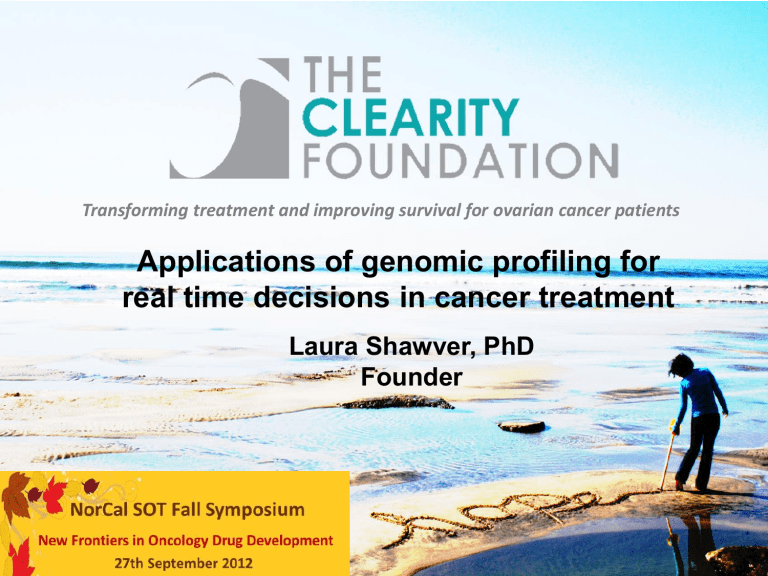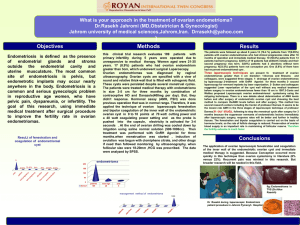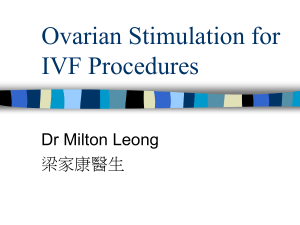Dr. Shawver: Applications of Genomic Profiling for Real Time
advertisement

Transforming treatment and improving survival for ovarian cancer patients Applications of genomic profiling for real time decisions in cancer treatment Laura Shawver, PhD Founder Overview Ovarian Cancer statistics and treatment Clearity Foundation: mission and process Clearity profiling panel and results interpretation Incorporating profiling in clinical trial designs Ovarian cancer statistics and standard of care 22,280 new cases and 15,500 deaths estimated in the US in 2012 ~75% diagnosed at stage III/IV Most treated with surgical cytoreduction followed by adjuvant platinumtaxane based chemotherapy Most patients recur within 2 years and receive multiple rounds of subsequent chemotherapy 27% survive >10 years Multiple choices for recurrent disease Can we inform the treatment decision? NCCN Guidelines for Epithelial Ovarian Cancer/Fallopian Tube Cancer/Peritoneal Cancer 3.2012 The Clearity Foundation launched as a nonprofit organization in 2008 to: Bring molecular profiling to the forefront of ovarian cancer diagnosis and treatment Assist doctors in identifying therapy informed by their patient’s tumor molecular profile Expedite the clinical development of novel targeted agents for ovarian cancer Increase the probability of success by utilizing molecular profiling to select patients for clinical trials Leading advisors and scientific presentations Scientific Advisory Board Beth Karlan, MD, Chair Cedars Sinai & UCLA Medical Center Doug Levine, MD Memorial Sloan Kettering Cancer Center Johnathan Lancaster, MD Moffitt Cancer Center Julie Cherrington, PhD Pathway Therapeutics Ursula Matulonis, MD Dana Farber Cancer Center & Harvard Medical School Deb Zajchowski, PhD Clearity Foundation Scientific Director Mol Cancer Ther; 11(2) February 2012: Treatment-related protein biomarker expression differs between primary and recurrent ovarian carcinomas DA Zajchowski, BY Karlan and LK Shawver ASCO 2011: Expression Profiles in Matched Primary and Recurrent Ovarian Carcinomas DA Zajchowski, BY Karlan and LK Shawver, AACR 2011: Molecular Profiling in Recurrent Ovarian Cancer Patients DA Zajchowski, C Bentley, J Gross, BY Karlan and LK Shawver AACR 2010: Selecting Patients for Ovarian Cancer Clinical Trials by Profiling Tumors against a Broad Panel of Molecular Markers DA Zajchowski, J Gross, BY Karlan, K Bloom, D Loesch, A Alarcon and LK. Shawver 6 Ovarian cancers are molecularly heterogeneous Genomic alterations observed in nearly every chromosome Serous ovarian cancer Any one genomic alteration is found in only a small fraction of patient tumors One drug will not be effective for the population Drugs must be developed for specific molecular tumor types Profiling of individual tumors is essential A broad profiling panel is necessary 7 Data provided by Dr. D. Levine How Clearity works Clearity Profiling Services: •Physician and patient education •Testing coordination •Secure data analysis •Results reported to patient Oncologists and Patients Patient and medical team using molecular profiles to prioritize therapeutic options 8 Use tumor molecular profiles to inform choice of chemotherapy and/or clinical trial Chemotherapy Marker Panel Select chemotherapy for next treatment Targeted Therapy Marker Panel Select chemo for combination with targeted agent in clinical trial Select clinical trial with targeted agent 9 Key take away messages Chemotherapy agents are targeted cytotoxic treatments Chemotherapy will continue to play an important role but molecular targeted agents, on an individualized basis, will become increasingly important Molecular profiling is available to help prioritize treatments and will be increasingly utilized – for chemotherapy agents – for molecular targeted agents – for clinical trials Clinical trials should be considered early in the treatment process Current panel of IHC tests Growth Factors/ Receptors EGFR* Her2* IGF1R c-Met* VEGF PDGFR Cytoplasmic Signal Transducers and Apoptosis Regulators K-ras** B-raf** PIK3CA** PTEN Bcl-2 Survivin Cox-2 Nuclear Signaling Proteins Hormone Receptors/Transcription Factors ER AR PR Cell Cycle Ki67 p16 Rb Chemotherapy Sensitivity Markers DNA Synthesis/Transcription TLE3 Topo1 Top2A ECM SPARC Chemotherapy Resistance Markers Drug Transporters BCRP MRP1 * DNA amplification MDR1/PGP DNA Repair/ Modification ERCC1 ** DNA mutational analysis MGMT DNA Synthesis/Cell Division RRM1 TS TUBB3 11 Data stored and analyzed in Diane Barton Database UNK 3% Stage IV 6% Platinum Response I 8% II 7% NA 25% III 76% Histology TC UNK Ad SB CS 1% 2% 5% 1% 1% Refractory 7% Resistant 15% Sensitive 53% Specimen Source CC 6% Endo 8% GC 2% Mucin 2% MMMT 1% Serous 70% Primary peritoneal 20% Mixed 3% Distant Mets 5% *200 patients; March 15, 2012 (n=242; Aug 15, 2012) Ovary 34% Peritoneal recurrence 41% N=244 Data collected as histoscores Histoscore = % tumor stained x Intensity =92 Marker expression in all patients provides basis for interpretation of individual results 300 250 H Score 200 150 100 50 Box, inter-quartile range; line, median; whiskers, maximum and minimum values MGMT MRP1 BCRP SPARC PGP/MDR1 TLE3 TUBB3 ERCC1 RRM1 TS TOP2A TOPO1 Ki-67 PR AR ER COX-2 VEGF PDGFR Beta PDGFR Alpha c-MET IGF1Rb HER2 EGFR 0 Clinical research evidence for biomarkers is used to interpret results http://www.clearityfoundation.org/drugs-and-biomarkers.aspx Chemotherapy selection uses published evidence and expression cut-offs derived from current database 300 250 High Topo I Irinotecan, topotecan High Topo II Doxorubicin, etoposide 200 Low RRM1 Gemzar H Score* 150 Low TS Fluoropyrimidines 100 High SPARC nab-Paclitaxel High PGP No Taxane, no doxil 50 High BCRP No Topotecan BCRP SPARC PGP RRM1 TS TOP2A TOPO1 0 Low: <25th percentile High: >75th percentile Case Study: profile for patient diagnosed in 3/2005 Figure 5. Tumor Molecular Profile Informs Therapeutic Decisions with stage IIIB papillary serous carcinoma 300 3/2005 Carbo/tax x6 250 taxol 10 mos recurrence 12/2008 carbo/tax x 6 150 carbo/tax/bev x3 100 12/2009 Doxil x3 50 Surgery 1/2010 MGMT MRP1 BCRP SPARC PGP/MDR1 TLE3 TUBB3 ERCC1 RRM1 TS TOP2A TOPO1 Ki-67 PR AR ER COX-2 VEGF PDGFR Beta PDGFR Alpha c-MET IGF1Rb HER2 0 EGFR H Score* 200 Tumor Profiled Gemzar 17 Case Study: profile for patient diagnosed in 3/2005 Figure 5. Tumor Molecular Profile Informs Therapeutic Decisions th percentile) High EGFR (98 with stage IIIB papillary serous carcinoma EGFR inhibitors have been ineffective in clinical trials although benefit seen in individual patients Mutations can predict sensitivity and resistance to EGFR inhibitors in lung cancer Follow up mutation analysis conducted; patient was wt 300 250 150 100 50 taxol 10 mos recurrence 12/2008 carbo/tax x 6 carbo/tax/bev x3 12/2009 Doxil x3 Surgery 1/2010 MGMT MRP1 BCRP SPARC PGP/MDR1 TLE3 TUBB3 ERCC1 RRM1 TS TOP2A TOPO1 Ki-67 PR AR ER COX-2 VEGF PDGFR Beta PDGFR Alpha c-MET IGF1Rb HER2 0 EGFR H Score* 200 3/2005 Carbo/tax x6 Tumor Profiled Gemzar 18 Case Study: profile for patient diagnosed in 3/2005 Figure 5. Tumor Molecular Profile Therapeutic Decisions High Informs ER with stage IIIB papillary serous carcinoma Anti-estrogens and aromatase inhibitors utilized in ovarian 3/2005 Carbo/tax x6 cancer patients but not approved taxol 10 mos due to lack of efficacy in clinical studies recurrence 12/2008 300 250 carbo/tax x 6 150 carbo/tax/bev x3 100 12/2009 Doxil x3 50 Surgery 1/2010 MGMT MRP1 BCRP SPARC PGP/MDR1 TLE3 TUBB3 ERCC1 RRM1 TS TOP2A TOPO1 Ki-67 PR AR ER COX-2 VEGF PDGFR Beta PDGFR Alpha c-MET IGF1Rb HER2 0 EGFR H Score* 200 Tumor Profiled Gemzar 19 Case Study: profile for patient diagnosed in 3/2005 Figure 5. Tumor Molecular Profile Informs Therapeutic Decisions with Highstage SPARCIIIB papillary serous carcinoma Clinical trial for nab-paclitaxel (none at the time) or off-label use patient had long history of taxane treatment 300 250 taxol 10 mos recurrence 12/2008 carbo/tax x 6 150 carbo/tax/bev x3 100 12/2009 Doxil x3 50 Surgery 1/2010 MGMT MRP1 BCRP SPARC PGP/MDR1 TLE3 TUBB3 ERCC1 RRM1 TS TOP2A TOPO1 Ki-67 PR AR ER COX-2 VEGF PDGFR Beta PDGFR Alpha c-MET IGF1Rb HER2 0 EGFR H Score* 200 3/2005 Carbo/tax x6 Tumor Profiled Gemzar 20 Case Study: profile for patient diagnosed in 3/2005 Figure 5. Tumor Molecular Profile Informs Therapeutic Decisions with stage IIIB papillary serous carcinoma 300 3/2005 Carbo/tax x6 250 taxol 10 mos 200 150 100 50 MGMT MRP1 BCRP SPARC PGP/MDR1 TLE3 TUBB3 ERCC1 RRM1 TS TOP2A TOPO1 Ki-67 PR AR ER COX-2 VEGF PDGFR Beta PDGFR Alpha c-MET IGF1Rb HER2 0 EGFR H Score* recurrence 12/2008 Low TS carbo/tax x 6 Fluoropyrimidinescarbo/tax/bev x3 and pemetrexed 12/2009 considered as a Doxil x3 reasonable optionSurgery 1/2010 Tumor Profiled Gemzar 21 Case Study: profile for patient diagnosed in 3/2005 Figure 5. Tumor Molecular Profile Informs Therapeutic Decisions with stage IIIB papillary serous carcinoma 300 3/2005 Carbo/tax x6 250 200 Low RRM 150 High RRM1 associated with resistance to gemcitabine 100 Gemcitabine is an approved agent in recurrent 50 ovarian cancer recurrence 12/2008 carbo/tax x 6 carbo/tax/bev x3 12/2009 Doxil x3 Surgery 1/2010 MGMT MRP1 BCRP SPARC PGP/MDR1 TLE3 TUBB3 ERCC1 RRM1 TS TOP2A TOPO1 Ki-67 PR AR ER COX-2 VEGF PDGFR Beta PDGFR Alpha c-MET IGF1Rb HER2 0 EGFR H Score* taxol 10 mos Tumor Profiled Gemzar 22 RRM1 is gemcitabine’s target and efficacy biomarker Drug Mechanism of Action Gemcitabine Inhibits cell division by blocking DNA synthesis Gem 3 Gem GemPP-> GemPPP 4 DCK ENT1 5 2 HuR RRM2 RRM1 1 Blocks DNA synthesis Growth inhibition dCDP CDP Gemcitabine Resistance Markers Marker Name Biological Role Evidence References RRM1 ribonucleotide reductase, regulatory subunit M1 Enzyme synthesizes deoxyribonuceosides from ribonucleoside precursors High protein levels associated with poor response and outcome in pancreatic, biliary, and NSCLC patients after gemcitabine-based therapy Akita, Zheng et al. 2009; Reynolds, Obasaju et al. 2009; Nakamura, Kohya et al. 2010 RRM2 For ribonucleotide reductase, information on each regulatory subunit Enzyme synthesizes High mRNA expression correlated Itoi, Sofuni et al. 2007; deoxyribonuceosides from with poor outcome following Boukovinas, Papadaki et al. marker, visit http://www.clearityfoundation.org/drugs-and-biomarkers.aspx ribonucleoside precursors gemcitabine treatment in 2008; Souglakos, 23 Case5.Study: profile Profile for patient in 3/2005 Figure Tumor Molecular Informsdiagnosed Therapeutic Decisions with stage IIIB papillary serous carcinoma 300 3/2005 Carbo/tax x6 250 200 recurrence 12/2008 carbo/tax x 6 150 carbo/tax/bev x3 12/2009 Doxil x3 100 Ge,zar MGMT MRP1 BCRP SPARC PGP/MDR1 TLE3 TUBB3 ERCC1 RRM1 TS TOP2A TOPO1 Ki-67 PR AR ER COX-2 VEGF PDGFR Beta PDGFR Alpha Tumor Profiled c-MET 0 IGF1Rb Surgery 1/2010 HER2 50 EGFR H Score* taxol 10 mos Gemzar Gemzar (3/2010) Gemcitabine 9/2011: NED 24 Often, only one of the commonly used agents to treat recurrent ovarian cancer is prioritized by the profile Pemetrexed, capecitabine Gemcitabine Topo I inhibitors Topo II inhibitors Teal, tumor marker expression met quartile cutpoint criterion: RRM1, TS <25th percentile; TOP2A, TOP1 >75th percentile. 150/196 (76%) can be assigned to one of these agents. 25 Biopsy of recurrent disease is needed to obtain relevant profiling information Mol Cancer Ther; 11(2) February 2012 Primary Recurrence EGFR 5% 2+; 10 68% 3+; 255 26 Marker expression differences in patient-matched primary and recurrent samples H score 160 35SE-M-S 40 35SE-O-S 10 EGFR HER2 IGF1Rb c-MET VEGF COX-2 ER Ki-67 TOPO1 TOP2A TS RRM1 ERCC1 PGP SPARC BCRP MRP1 MGMT 42S-MD-S H score 160 42S-M-S 40 42S-P-S 10 EGFR HER2 IGF1Rb c-MET VEGF COX-2 ER Ki-67 TOPO1 TOP2A TS RRM1 ERCC1 PGP SPARC BCRP MRP1 MGMT Our knowledge and ability to rationally target ovarian cancer has evolved since 2008 Molecular characterization of ovarian tumors reveals new means for targeting and stratifying patients Advances in methods for genomic characterization of tumor samples (next-gen sequencing in CLIA setting) Increase in the number of molecularly targeted agents entering trials for ovarian cancer 28 Low frequency of specific genetic aberrations in primary high grade serous ovarian carcinoma —> extensive genomic interrogation necessary to characterize tumors 29 From TCGA study: Nature 474, 609- 615 (2011) Genomic markers can be used to assign patients to clinical trial agents PARP inhibitors RB PI3K/RAS HR Alterations/BRCAness CDK inhibitors AURK inhibitors PI3K/AKT/mTOR inhibitors MEK inhibitors Notch Notch inhibitors From TCGA study: Nature 474, 609- 615 (2011) 30 New emphasis for profile: clinical trial selection Chemotherapy Marker Panel Select chemotherapy for next treatment Targeted Therapy Marker Panel (IHC and DNA SEQ) Select chemo for combination with targeted agent in clinical trial Select clinical trial with targeted agent 31 Expanded panel provides more options for Clearity patients ChemoTx panel Chemosensitivity Markers DNA Synthesis/Cell Cycle Topo1 Top2A Transcription/Translation Regulators TLE3 HuR Drug Transporters/Metabolism ENT1 DCK Ki67 IHC Chemoresistance Markers Apoptosis Regulators Survivin DNA Repair/ Modification ERCC1 MGMT DNA Synthesis/Cell Division RRM1 RRM2 TS Drug Transporters MDR1/PGP BCRP MRP1 TUBB3 Taxanes Gemcitabine Doxil Topo I inh (Pemetrexed) Clinical trial options Targeted Tx panel GF / Receptors EGFR* Her2* IGF1R* c-Met* Genotype Analysis: Mut/Fusions/Transloc/Amp-Del ABL1 ATM ATR BRCA1 BRCA2 BAP1 PRKDC TOP1 ERCC2 FANCA MLH1 DNA Repair MRE11A MUTYH MSH2 MSH6 TP53 MDM2 MDM4 ARAF RAF1 BRAF GNA11 NF1 GNAQ NRAS GUCY1A2 HRAS KRAS MAP2K1 MAP2K2 MAP2K4 PTCH1 PTCH2 SMO SUFU BCL2 BCL2A1 BCL2L1 BCL2L2 MCL1 BCL6 VEGF NOTCH1 NPM1 HOXA3 NTRK1 NTRK2 NTRK3 RAS-MAPK TNKS TNKS2 SOX10 SOX2 ALK TGFBR2 RUNX1 SMAD2 SMAD3 SMAD4 IHC + DNA Seq* PDGFR* ER* PHLPP2 AKT1 PIK3CA AKT2 PIK3CG AKT3 PIK3R1 PTEN PTPN11 STK11 RICTOR RPTOR MTOR PI3K-AKT-MTOR TSC1 TSC2 JUN ERG PAX5 NF2 PAK3 PTEN* Bcl-2* PKHD1 CD79A CARD11 CD79B TNFAIP3 IKBKE PTPRD AURKB AURKA MYCL1 MYCN MYC Cell Cycle GATA1 CEBPA RARA ESR1 AR NKX2-1 Cell Cycle/ Survival CDKN2A CDKN2B CDKN2C RB1 CCND1 CCND2 CCND3 CCNE1 CDK4 CDK6 CDH1 CDH2 CDH20 CDH5 EZH2 ARID1A SMARCA4 SMARCB1 KDM6A DNMT3A DOT1L CHEK1 CHEK2 HSP90AA1 USP9X WT1 LRP1B LRP6 DDR2 CTNNB1 CDK8 APC CRKL CRLF2 IKZF1 Plus more……. GNAS IDH1 IDH2 ARFRP1 TBX22 TET2 MLL MEN1 SRC PLCG1 FOXP4 VHL FBXW7 MPL STAT3 JAK1 JAK2 JAK3 INHBA MITF ERBB2 EPHA3 EPHA5 ERBB3 EPHA6 ERBB4 EPHA7 EPHB1 FGFR1 EPHB4 FGFR2 EPHB6 FGFR3 FGFR4 ABL2 FLT1 FLT3 FLT4 KDR MET EGFR IGF1R Membrane INSR IRS2 Receptors PDGFRA PDGFRB RET CBL KIT IGF2R GPR124 LTK Cox-2 Survivin Rb* BRCAnalysis (DNA Repair/HR Pathway Marker Panel) DNA repair inhibitors Cell cycle inhibitors Proliferation/ survival signaling inhibitors P16* CCND1* * Next-gen exon sequencing of 182+ genes 32 Frequency of hotspot mutations in PIK3CA, KRAS, BRAF, and EGFR is histologydependent Clear cell: PIK3CA Mucinous and carcinosarcoma: KRAS PIK3CA KRAS BRAF EGFR WT Mut WT Mut WT Mut WT Mut Serous 82 1 66 1 11 0 10 0 Endo 13 2 6 1 2 0 1 0 CC 4 5 2 0 1 0 1 0 Muc 2 0 2 1 1 0 3 0 Ad 3 1 4 0 1 0 1 0 C (MM) 2 0 1 2 1 0 0 0 SB 1 0 1 0 1 0 0 0 Examples of gene alterations in recurrent ovarian cancer Histology TP53 MDM2 KRAS MUT S S S S S S S S S S S MUT AMP MUT MUT MUT SS MUT TR NF1 CCND1CCND2 CCNE1 MYC MYCL1 MYCN BRCA1 BRCA2 ATM IGF1R PATCH CDK4 MCL1 PIK3CA FS AMP FS AMP AMP FS AMP AMP AMP AMP AMP FS FS AMP AMP TR AMP AMP AMP AMP CC CC* MUT MX-ECCM MX-ECC AMP >5-fold AMP ≤5-fold AMP AMP MUT MUT MUT MUT SS, splice site mutation; FS, frameshift; TR, truncation MUT Case Study: profile for patient diagnosed in 2009 with stage IIIC clear cell carcinoma 300 4/2009 CDDP/tax (ip) x 3 Carbo/tax (iv) x3 250 12/2009 recurrence 150 Tumor profiled 100 1/2010 Topotecan + AMG 386* (clinical trial) 50 Topotecan PGP MGMT MRP1 BCRP ERCC1 RRM1 TS TOP2A TOPO1 AR PR ER Ki-67 COX-2 EGFR 0 HER2 H Score* 200 5/2011 Stable disease Case Study: profile for patient diagnosed in 2009 with stage IIIC clear cell carcinoma 300 4/2009 CDDP/tax (ip) x 3 Carbo/tax (iv) x3 250 12/2009 recurrence 200 Tumor profiled H Score* IHC Results Irinotecan 150 100 5/2011 Stable disease 50 6/2011 Surgery -residual disease Tumor profiled PGP MGMT MRP1 BCRP TUBB3 RRM1 ERCC1 TS TLE3 SPARC SPARC TOP2A TOPO1 PR AR ER Ki-67 COX-2 c-MET IGF1Rb EGFR HER2 0 DNA Sequencing Results RxIrinotecan + Everolimus Gene Mutation Approved Drugs and Clinical Trial Agents PIK3CA 1/2010 Topotecan + AMG 386* (clinical trial) H1047R PI3K inhibitors, mTOR inhibitors (rapamycin, temsirolimus, everolimus) Everolimus 9/2012 NED Protein and DNA results are integrated into one report that highlights therapy options SUMMARY of AGENTS IHC Results IHC results—Drug correlations DNA Sequencing Results Clearity report summarizes results from multiple labs and provides consensus interpretation Summary of relevant patient medical history Summary of agents (approved and in clinical trials) associated with clinical benefit extracted from pg 2 Compilation of data from all labs with interpretation (percentile rank, potential drugs) Individual profile compared to ovarian cancer population Contact information for help with clinical trials, lab reports. Number of patients whose data are included in Diane Barton Database 38 New emphasis for profile: clinical trial selection Chemotherapy Marker Panel Select chemotherapy for next treatment Targeted Therapy Marker Panel (IHC and DNA SEQ) Select chemo for combination with targeted agent in clinical trial Select clinical trial with targeted agent 39 Vision of an Ovarian Cancer Clinical Trials Coalition (OCCTC) Increase the probability of drug development success by utilizing molecular profiling to select patients for clinical trials Facilitate access to eligible patients through patient advocate-driven clinical trials education, outreach, and established web portal for clinical trials identification and matching Remove barriers for screening large number of patients for enrollment by testing for all drug biomarkers in every patient Reduce costs of profiling assays and make efficient use of biopsy samples Make more treatment options available for ovarian cancer patients 40 Summary • Ovarian cancer is heterogeneous and a broad profiling panel is needed to capture data relevant to each individual • Commonly utilized agents for treatment of recurrent ovarian cancer can be prioritized using molecular markers • Molecular profiling can help prioritize drugs being tested in clinical trials 41 Thank you! • To everyone who has participated in the Clearity process • To our physician partners • To the Clearity team • • • • Dr. Deb Zajchowski Hillary Theakston Kathleen Zajchowski And our volunteers! 42 www.clearityfoundation.org









